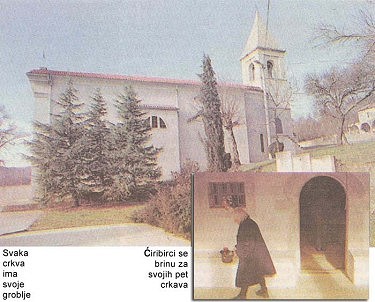|
ISTRIAN PHENOMENON They have their own language, they call it "ciri-biri", they would like that their children stay with them. Istro-Romanians: Let the Teacher Come, the Password is "Bura zi"
© Večernji list The oldest person from Susnjevica, Franic, who is 81, put a brown cap on his grey head, without any trembling in his voice he sang the sweetest aria "ooo nopte iooo uaaaam aan misaaad" ( one night i dreamed about you). |
|||
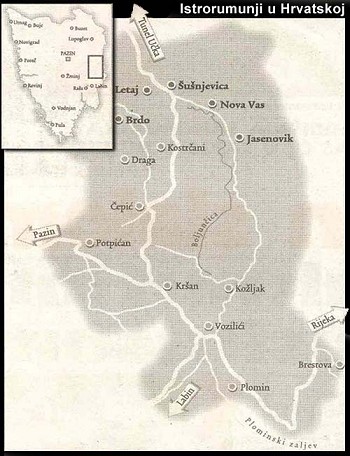 There
are 470 of them in the village of Susnjevica, the hamlets of
Letaj, Nova Vas, Brdo and Jasenovic, and are establishing an association for all
who speak the same language which is about 700 years old There
are 470 of them in the village of Susnjevica, the hamlets of
Letaj, Nova Vas, Brdo and Jasenovic, and are establishing an association for all
who speak the same language which is about 700 years oldNu se ştie cât al'e, betâr şapte stotine de an, a zdrâjita limba pira åstez. Jel'es istrorumuni. Nu bacil'ejs, de prevodi an hrvâtsko. Or:"They don't know how many there are, they are seven centuries old, and have their own language. They are Istro-Romanians, don't worry, next translation is in Croatian." This exotic language does not come from an unknown country. They call it Istro-Rumanian, for one hundred years it has been spoken in Susnjevica in Istria in the [current] municipality of Krsan. Susnjevica is a deserted oasis where you can find serious and humble people. Romanians have lived here for a long time and one can only trace them by their language. A peaceful place not far from Albona. It was announced last week by the Council of Susnjevica, Josip Kontus, as to how they will revive an association for Istro-Romanians for the people that speak that language that had been established in 1995 but was dormant.
The language sounds are mixed with Italian, Romanian and the Istrian cakavski dialect. The origin is Romanian but they added a few expressions from other languages. For now, the people from Susnjevica want a teacher that will instruct their children in this mixed language. Their language was carried down from one generation to another through the centuries. Through the narrow streets of Susnjevica we are looking to speak to someone. There is no sign of life. Houses are next to one another, closed, with shutters closed. No one comes out even from those houses where you see smoke coming out of the chimney outside is cold. Only 81-year-old Franjo Belulovic is walking near the local co-operative [store], helping himself with a wooden stick. He smiled when we greeted him.
Question: how often do you speak Istro-Romanian, Franic? He fires back: "When don't I speak it? I knew no other language until I was five years old.This is what my granfather told me." Franic has lived all his life in Susnjevica. When he was six years old, he lost his mother and father. He worked in the family's business as a blacksmith. He went to a military school in Slovenia, as a partizan he fought for NOB (National Liberation Corps?). He never married, he lives alone. "At school I spoke Slovenian, the religion was taught to me in Italian, during the war I spoke Croatian. Mostly I speak Vlaski, they call it Istro-Romanian and this is how we all speak in the family." Franic sang to the girls the song "Lili Marlene" Franic said his grandfather taught him a lot of folk-stories/legends. As we sat by the fire and late into the night with the fire crackling, he told us some of the stories.
But the one that Franic likes the best is the one about shoemaker and the devil. As this 81-year-old speaks he likes songs more. Without any trembling in his voice putting a brown cap on his head he sang one of his sweetest songs, "Ooo nopte ioooo uaaaam oam misaaad..." [Full text, with translations] Hit "Onopte io uam anmisad" for us he translated it to "One night I dreamed about you". He was inspired by the singer Liljana Petrovic so he changed her text in the song with his text. The one that is known "The small house on the hill". He sang it as "Su codru ai cåsa mica" when he was young he sang "Lili Marlene" to the girls but, of course, in Istro-Romanian. "I translated the whole text except in the references where it mentioned Lili Marlene I sang "cu tire voio fiiii". Of course, when I was a partisan I didn't sing that." He was smiling. Beaming Franic surprised us by his sharp memory: dates, happenings, February 15, 1934 his mother died; July 26, 1958 the parish priest, Branko Fabio died; "On November 17, 1944, we formed the artillery division at Mrkopolju." He smiles to himself. "At the school in Maribor they told me that I think to much and I am quite sharp." |
Small Dictionary Good day - Bura zi They were discovered by a bus load of Romanian diplomats A lot of letters were written by Romanians from USA to the city council when they heard about Istro-Romanian, but the Romanian authorities wanted to know even more said Josip Kantus. Last year Romanian authorities visited Zagreb. With the diplomats came Romanian national television crew who filmed documentary at Susnjevica. From Romania they sent a lot of pictures tourist prospects and history books. Nobody in Susnjevica even thought to seek Romanian Citizenship or something similar for us is important to preserve our language and include our language as a subject to be studied in our schools. Politics are of no interest to us smiling said Josip Kontus. ISTRIAN ZUPAN IVAN JAKOVCIC They are microcosms and they will get a teacher The population of Susnjevica sees their zupan, Ivan Zupan as their protector. Before anybody he recognized the value of Istro-Romanian language and he is busy trying to preserve it said Jakovcic our county can do a lot for the Istro-Romanians. On numerous occasions we spoke how we can save language and our Istrian diversity. Istrorumanian is an unbeliavable microcosm in Istria, not many know about it. Not long ago I tried to contact the people to tell them to preserve their idendity and the treasure their language. This small population must find a way to preserve their identity, the county will help them. We will pay what we have to e.g. teachers for the Istro-Romanian language the population must decide what their needs are, said Jakovcic. From "cire bire" they became Ciri-biri The nickname was given to them by the Istrian people which come from an expression "cire bire" which means in Croatian [Ed. note: it is in Istro-Romanian, not Croatian] stand firm. The legend said that Romanians worked in the port of Fiume as manual laborers. They carred the heavy r loads and they would encourage each other by saying "cire bire" for which Istrians started calling them "Ciri-biri". Istrian writings say that the Romanian people were very poor and they took their chances cultivating the poor soils, and they transported wood and charcoal to Fiume and Trieste. |
||
|
They took the language to the USA
Franic said many Istro-Romanians are proud of their language and they speak it parallel to the Croatian. At home they still call themselves "Vlahi" and "Ciribiri". But Josip Kontus, founder of the association told us that historians did not determine exactly why the Romanians came to Istria. There are many legends with many variations. At certain places, it is written that they came in the 15th century when fleeing the Turks.They were shepherds and farmers and they blended into a new environment. The only thing that tells the story is the language. "They didn't leave any trace", said Kontus.
Nowhere in the world are Istro-Romanians known as in Croatia. In the 1950s a lot of people from Susnjevica moved away. There were more than a 1000, now there are only 470 in Letaj, Nova Vas, Brdo and Jasenovic. The majority went to the USA looking for a better life, and with them they took the Istro-Romanian language. They speak it well, we hear them when they come home for holidays. We think that today this language is spoken by a few hundred people. A few years ago, there were many arguments about the Romanian origin. There was a historian Josip Milicevic who went to see Kontus. He wanted to correct the name to Rumeri and not Istro-Romanian.To these arguments Kontus shook his head. How nice it would be if some ethnolog or historian were to find their origin. The language is our proof that Romanians lived in Istria, this is our strongest argument. Five churches for 470 people
From the middle of Susnjevica the view streches to the fertile Cepic field - Tarufa Oasis - the white church Svetog Ivana Krstitelja (St. John the Baptist), was restored two years ago, near the fertile black soil and the grey houses made out of stone. Near it is the cooperative building painted in red and inside there is the post office and a grocery store. Leaning against the red building is a small building which has a sign "Tina" which proves that in the past the village had a coffee shop. The young ones smile at the newcomers. There are not too many guests during the winter. A young girl and three young boys play soccer on the road toward the school playground. Shyly with vibrating smiles they tell their names Sonja, Korado, Andrej and Marko. We told them we came because of their language, they don't answer immediately. "This is not our language we don't know it. Only the old ones speak it. We don't understand it very much." Croatia has a dictionary of Istrorumanian language, Linguist August Kovacec wrote it few years ago. The little ones will have a chance to learn the language that the old ones speak. Josip Kontus promised that the Istro-Romanian association will do everything possible to bring a teacher in the spring.
Photo captions: First pictureThe oldest native of Susnjevica Franic 81 he put brown cap on grey head and without any trembling in his voice he sang sweetest aria "ooo nopte iooo uaaaam ann misaaad one night a dreamed of you."
Picture in the middle of the page Young children sitting Middle of page Kids playing Church in the picture Translation by Bruno Clapci, edited by Marisa
Ciceran Source:
|
|||
|
This page compliments of Marisa Ciceran and Bruno Clapci Created: Sunday, September
88, 2002, Last Update:
Tuesday, March 15, 2022
|
|||
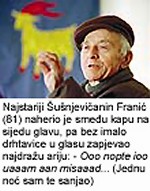 Within
the family they speak vlahski
Within
the family they speak vlahski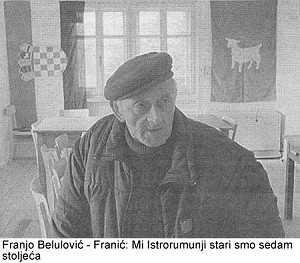 "I'm
the oldest in the village, and Istro-Romanians are seven centuries old. Seven
caravans came here during the black plague, two caravans went to Ciceria, five
remained here. This is what the elders told me", said Franic, as they call him
in Susnjevica.
"I'm
the oldest in the village, and Istro-Romanians are seven centuries old. Seven
caravans came here during the black plague, two caravans went to Ciceria, five
remained here. This is what the elders told me", said Franic, as they call him
in Susnjevica.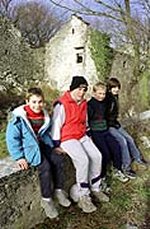
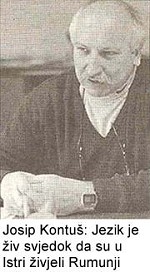 Mr
Josip has had a private business, his days are filled with projects. For decades
he forced himself to push the idea to preserve Istro-Romanian language that he
himself does not speak, but understands. The neighbours greet him with "bura zi"
- good day.
Mr
Josip has had a private business, his days are filled with projects. For decades
he forced himself to push the idea to preserve Istro-Romanian language that he
himself does not speak, but understands. The neighbours greet him with "bura zi"
- good day.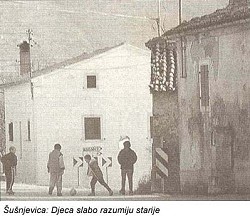 There
are no monuments, then in the middle there is a partisan memorial
There
are no monuments, then in the middle there is a partisan memorial
